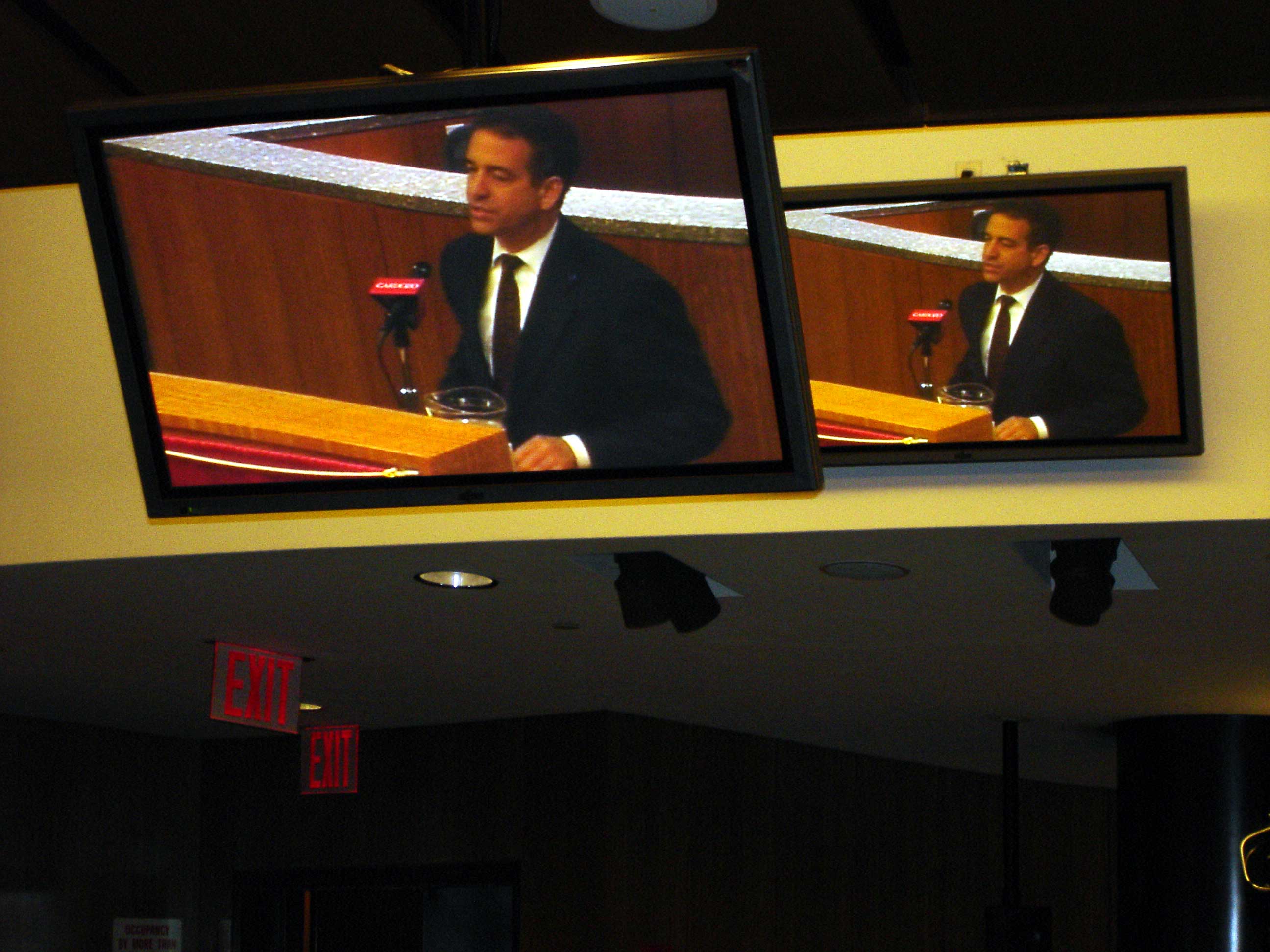My, what a coincidence. New majority leader John A. Boehner is “renting his Capitol Hill apartment from a veteran lobbyist whose clients have direct stakes in legislation Boehner has co-written and that he has overseen as chairman of the Education and the Workforce Committee.” That’s Strike 3: Coupled with his stonewalling on lobbying reform and his passing out Big Tobacco checks on the House floor in 1995, it’s becoming abundantly clear that Boehner is just another corrupt GOP party boss in the DeLay mold. I wonder, will that sword of righteousness, John McCain, have anything to say about Boehner’s behavior?
Tag: GOP Culture of Corruption
Another Break in the Ranks?
As critics in both parties poke more holes in Dubya’s flimsy NSA defense, Republican congresswoman Heather Wilson of New Mexico, chairwoman of the House Subcommittee on Technical and Tactical Intelligence, calls for a “complete review” of Dubya’s wiretapping program.
Boehner’s Boys, Boehner’s Boondoggles.
“In the past, when these scandals have erupted, what’s happened is Congress has overreacted, and two days later nobody knew what happened…taking actions to ban this and ban that, when there’s no appearance of a problem, there’s no foundation of a problem, I think, in fact, does not serve the institution well.” No appearance of a problem?(!) New GOP Majority Leader John Boehner may have brought a new cadre of GOP leaders to the fore, but, when it comes to lobbying reform, they may as well be the Old Guard. And with Boehner, who has his own corporate masters, now actively working to prevent any real changes in lobbying practices, the fate of real reform may now lie in the hands of none other than Casino Jack: “If disgraced lobbyist Jack Abramoff drops the dime on a bunch of lawmakers and several of them are indicted, Congress won’t be able to say no to even the harshest anti-lobbying measures…But if Abramoff dawdles and not much happens, lawmakers will take their sweet time moving legislation through committee.”
Shadies gotta stick together.
Despite well-publicized concerns in their own Justice Department (which were overruled by senior officials), the White House rides to the rescue of Boss DeLay’s troubling redistricting plan by filing an amicus brief before the Supreme Court. “DeLay’s efforts on behalf of the plan resulted in his being admonished by the House Ethics Committee and indicted on charges of illegally diverting money to the campaigns of state legislators who drew the new map.“
Blunt talk.
“‘Clearly, Blunt has demonstrated great leadership; Cantor has, too,’ Rep. Mark Foley (R-Fla.) said. ‘Are we saying we don’t trust anyone in our leadership? That makes the case that everybody in Washington is on the take, that we’re all corrupt.'” Yeah, that sounds about right…Sensing electoral doom in the growing public perception that the GOP is rife with corruption, Boehner and Shadegg contemplate joining forces to knock off Boss DeLay’s heir apparent, Roy Blunt, in the House leadership race.
Filibusted.
I already mentioned this in the Feingold post below, but it merits its own space: The brief Alito filibuster is already over, with nineteen Dems voting for cloture. There are a lot of blogs calling for the heads of the “Vichy Dems” right now, and, true, they’re not looking too good right now. But, frankly, neither is anyone else. The whole thing reeks of mismanagement and rank opportunism across the party.
I’m with Walter Shapiro: “In hindsight, the battle was effectively over after the first day of the Senate hearings when the criminally verbose Judiciary Committee Democrats failed to sustain a clear and consistent anti-Alito argument with all those cable networks broadcasting live. When politicians and interest-group leaders know that they are going to lose, they automatically retreat to a can-I-get-anything-out-of-the-wreckage calculus. So moderate senators from red states like South Dakota’s Tim Johnson decide that they can buttress their independent credentials with home-state conservatives by supporting Alito, since the outcome would be the same no matter how he voted. Groups like People for the American Way realize that shrill calls for a filibuster might preserve their fundraising base even if their years of urgent appeals to prevent a right-wing Supreme Court takeover failed to change a single Senate vote. And Kerry — whose late entry into the anti-Alito fray can be partly excused by his not serving on the Judiciary Committee — is also aware that such dramatic gestures help him maintain an up-to-date, ready-for-’08 e-mail list of Democratic activists.”
At any rate, the silver lining of this judicial nightmare (other than Judge Kennedy’s potential unpredictability) is that tomorrow, after Alito is voted through and Dubya gives his State of the Union, the GOP are officially out of good news. From tomorrow on, all the stories on tap, the continuing Iraq quagmire notwithstanding, are hearings and investigations — into the NSA wiretaps, into Abramoff, into Plamegate, into Katrina. So let’s pick ourselves up off the floor and get it together — We’ve got serious questions to ask of this administration, and, more importantly, we’ve got ourselves an election in nine months.
Big Russ.
With a tip-off from the Progressive Patriots Fund, I had the opportunity yesterday to catch Sen. Russ Feingold speak on the Patriot Act and the NSA wiretapping scandal over at Cardozo Law School. (Their pics are a lot better than mine — I forgot to charge my batteries, and thus only got in 2 or 3 shots before my camera died on me.) And how was he? Well, all-in-all, he came off as a convincing candidate for the election ahead, as well as an impressive, informed, and personable fellow. To be honest, I found his remarks a bit lawyerly (then again, he’s a lawyer speaking before a law school, so that’s not really a fair criticism), but, taken in full, he seemed a committeed progressive and a refreshingly candid leader, the type of dynamic, independent thinker the Senate should be teeming with, if the system came anywhere close to working these days.
The gist of Sen. Feingold’s remarks was thus: Al Qaeda is the central threat facing America and has been since 9/11. Yet, instead of bringing the nation together to eliminate this terrorist organization, the Dubya White House has chosen time and time again to endanger our national security and compromise our most fundamental American values for their own ideological or power-hoarding purposes. (Iraq, Guantanamo, extraordinary rendition, secret gulags, you name it.) Along those lines and as we now all know, the Patriot Act, which only Feingold voted against in 2001, contains some terrible provisions therein, the most notorious example affecting Middle America being Section 215 (which gives law enforcement, among other things, the right to see what you’ve been reading.)
Yet, as per the norm, Dubya has refused to admit that it’s even possible that something might be wrong with the Patriot Act now that it’s up for renewal — only that it’s necessary to defeat the evildoers and that any microscopic change in the statute could rend the fabric of freedom irreparably. (Despite this now-somewhat hoary ploy, Feingold and others have succeeded in blocking a permanent blanket extension for now, as y’all know if you’ve been visiting here lately.) And, of course, Dubya has taken this same tack of obfuscation and fear-mongering to cover up his brazen wiretapping power-grab — which, according to Congress’s own research arm, broke at least two laws and counting.
Again, this story is not news to many Dems out there, but Feingold laid it out in clear, comprehensible, and systematic fashion. (The only “breaking news” made was the Senator announcing this letter to Gonzales, asking him why he, in effect, lied to the Judiciary Committee during his confirmation hearings about the NSA wiretaps.) And he had some good lines throughout — In reply to Rove’s ridiculous claim that Dems were “pre-9/11”, Feingold quipped that the GOP suffered from a “pre-1776” mentality these days. (He also retold the recent Patrick Henry exchange.) To be honest, I’d liked to have heard more in this vein — In terms of breaking down the legislative legerdemain and legal issues at hand, Feingold was superb. But I thought the speech needed more narrative sweep and rhetorical grandeur, more explanation of why this battle matters so much to the workings of the republic. He doesn’t have to turn into Robert Byrd overnight. Still, I thought the remarks could have benefited from more dramatic heft and historical resonance: Jefferson, Madison, Adams, Lincoln, Wilson…they’re all relevant here. (Then again, as I said above, I was an historian sitting in a room full of lawyers, so I was a tougher sell than most.)
Along those lines, if there was a problem with this presentation, it’s that the Senator, while clearly outraged, at times seemed much less livid about all this than many in the audience, who occasionally sounded ready to hoist the black flag. (In fact, many will no doubt be happy to hear that Feingold was asked twice “why Democrats are so lame.” As he noted (and as the blogosphere can attest this week), if a crowd in New York City is this irate with the party, the Dems might be in serious trouble nationwide in November. Still, he also emphasized that the Democrats could be more effective fighters if they actually controlled a house of Congress — You can’t hold hearings if you’re in the minority.
In terms of other questions, Feingold said he supports and will take part in the very late-developing (and now already defunct) Alito filbuster (Roll Call.) In fact, he thought the Dems made a crucial mistake in capitulating to the original “Gang of 14” compromise, arguing cogently that Dems have seen nothing for it and may well have had the votes to win Catkiller‘s game of nuclear chicken. Since Casino Jack and lobbying reform seemed too big a subject to address competently in the time allotted, I asked him a question about his thoughts on the NYT decision to spike the NSA story for a year, his general view of the mass media’s performance in serving as a check on these types of executive abuses, and (’cause it seemed apropos) his thoughts on the burgeoning blogosphere’s role in all this. He didn’t really go after the Times decision, and said that, in terms of the recent Patriot Act debate, he thought the press had actually done an ok job. Regarding blogs, he called the Internet “a miracle for populist politics,” which was a good enough soundbite that everyone in my row dutifully wrote it down at the same time.
And, of course, Sen. Feingold was asked — a couple of times — whether or not he was running for President in 2008. Naturally, he played it coy — After all, we still have just under two years before the Iowa caucus. But, for what it’s worth, I was impressed by him — He’s not a first-class emoter like Edwards or Clinton, of course. Instead, he comes across as a highly intelligent, capable, and nuanced thinker, a la Bradley, Kerry, or Gore on his better days. But unlike those three, he also seemed much more comfortable in his own skin, more naturally himself at the podium, and — most importantly — more content to play the maverick if his lefty principles dictate thus. (Although, as I said, I’d like to see him tone down the lawyer-ese and rev up more Wellstone-ish fire if he does make a White House run.) I suppose there’s a small, bordering-on-infinitesimal chance that Rodham Clinton, Biden, Warner, or someone else might drop all the “New Democrat” protective camouflage this time around and begin loudly and undefensively proclaiming progressive principles to the Heavens. But, until that unlikely event, my candidate in the 2008 Democratic primary is Senator Russ Feingold of Wisconsin. (Update: 1776 link via Medley.)
Capitol Crimes.
“So what does real reform look like? There is no simple answer or silver bullet. If history is any judge, each round of ethics reforms lasts only a few years before lobbyists, lawyers and lawmakers pierce it full of holes. But ethics crusaders still hope to capitalize on this rare political moment, hurled forth on a powerful wave of corruption scandals plaguing the Republican Party.” Salon‘s Michael Scherer outlines five lobbying reforms that’ll determine whether Congress is serious about cleaning up the system in the wake of Casino Jack.
“The Power-Madness of King George.”
 “This extremity of Bush’s position emerges most clearly in a 42-page document issued by the Department of Justice last week. As Andrew Cohen, a CBS legal analyst, wrote in an online commentary, ‘The first time you read the “White Paper,” you feel like it is describing a foreign country guided by an unfamiliar constitution.’ To develop this observation a bit further, the nation implied by the document would be an elective dictatorship, governed not by three counterpoised branches of government but by a secretive, possibly benign, awesomely powerful king.” As Dubya embarks on another weeklong campaign of fear and distortion (as per standard Rovian operating procedure), Slate‘s Jacob Weisberg gapes at the audacity of Bush’s brazenly unconstitutional ploy for power. “[I]n his white paper, Bush as much as declares: ‘I determine what my words mean and I alone determine what yours mean, too.’…Bush’s message to the courts, like his message to Congress, is: Make way, subjects.“
“This extremity of Bush’s position emerges most clearly in a 42-page document issued by the Department of Justice last week. As Andrew Cohen, a CBS legal analyst, wrote in an online commentary, ‘The first time you read the “White Paper,” you feel like it is describing a foreign country guided by an unfamiliar constitution.’ To develop this observation a bit further, the nation implied by the document would be an elective dictatorship, governed not by three counterpoised branches of government but by a secretive, possibly benign, awesomely powerful king.” As Dubya embarks on another weeklong campaign of fear and distortion (as per standard Rovian operating procedure), Slate‘s Jacob Weisberg gapes at the audacity of Bush’s brazenly unconstitutional ploy for power. “[I]n his white paper, Bush as much as declares: ‘I determine what my words mean and I alone determine what yours mean, too.’…Bush’s message to the courts, like his message to Congress, is: Make way, subjects.“
In related news, Senate opposition to the Patriot Act — All the Dems and only four measly Republicans — seems to be holding firm for now, meaning that the old, unrevised version will remain in effect for the time being. Of course, if King George actually possessed the powers he’s arrogantly allocated to himself of late, there would be no need for a Senate vote on the Patriot Act at all. Hopefully, Arlen Specter understands the danger in these breathtaking assertions of unconstitutional power by Dubya, and will make his forthcoming Senate Judiciary hearings count for something. After all, given this administration’s blatant power grab, it’s no longer hyperbole to say that our republic is at stake.
All Ears (and No Earmarks).
“‘In 1994, when the Congress was taken over by Republicans, there were 4,000 earmarks on appropriations bills,’ [McCain] told the committee. ‘Last year there were 15,000. It’s disgraceful, this process.'” A Senate Committee chaired by Susan Collins and Joe Lieberman began discussing the Senate’s post-Abramoff cleanup today, with McCain, Feingold and others calling for systematic and comprehensive reform, including the end of “earmarking” (i.e. adding pork to appropriations bills.) “McCain said he was especially bothered that at the end of the last congressional session, various extraneous appropriations were ‘larded onto the money that was supposed to be devoted to the men and women in the military and their ability to conduct the war on terror.’“




